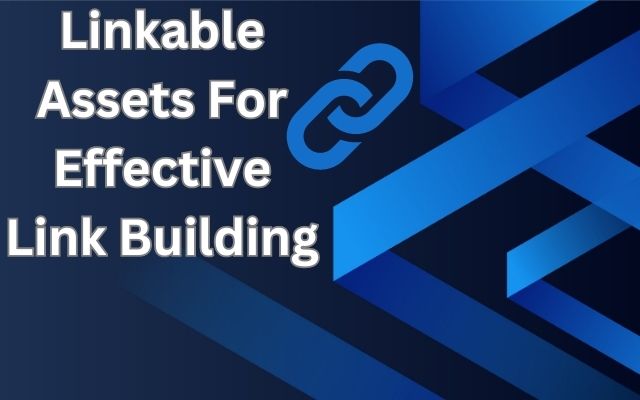Mastering the Art of Link Building: Effective Techniques for Boosting Your Website’s SEO

The art of link building involves strategically acquiring high-quality backlinks to enhance a website’s authority and visibility in search engine rankings.
Link building is an important aspect of search engine optimisation that has a significant influence on your website’s exposure, rankings, and success. You may increase the authority, organic traffic, and overall online visibility of your website by gaining high-quality backlinks from reliable sources.
The Importance of Link Building for SEO:
It plays a significant role in SEO by helping search engines understand the relevance and credibility of your website. When reputable websites link to your pages, search engines consider it as a vote of confidence, indicating that your content is valuable and trustworthy. This, in turn, can lead to higher search rankings, increased organic traffic, and improved online reputation.
Types of Links:
To understand link building better let’s explore the different types of links you may encounter:
Internal Links:
Internal links are links that connect different pages within your own website. They help establish a logical site structure, enhance user navigation, and distribute link equity throughout your site. By strategically interlinking relevant pages, you can improve the user experience and assist search engines in understanding your website’s hierarchy.
External Links:
External links, also known as outbound links, are links that connect your web pages to other websites. When reputable and relevant websites link back to your content, it signals to search engines that your website is a reliable source of information. External links can also drive referral traffic to your site and expand your online reach.
Do-follow Links:
Do-follow links are standard links that allow search engines to follow them and pass on link equity to the linked page. These links are valuable for SEO as they contribute to the authority and ranking of the linked page. Acquiring high-quality do-follow links from authoritative websites can significantly boost your SEO efforts.
No-follow Links:
No-follow links include a rel=”nofollow” attribute, indicating to search engines not to follow the link or pass on link equity. While these links do not directly contribute to SEO, they can still drive traffic, increase visibility, and diversify your backlink profile. No-follow links are often used for advertising, sponsored content, or user-generated content to maintain transparency and prevent spam.
White Hat SEO, Black Hat SEO & Grey Hat SEO
White Hat SEO:
White hat SEO refers to ethical and legitimate techniques for optimizing a website for search engines. These techniques comply with the guidelines set by search engines, such as Google, and aim to improve a website’s ranking in SERPs by providing value to users. Some examples of white hat SEO techniques include:
- Keyword research and optimization: Researching relevant keywords and incorporating them strategically into website content and meta tags.
- Content creation and optimization: Creating high-quality, informative, and unique content that satisfies users’ search queries.
- Building high-quality links: Acquiring links from other websites that have high domain authority and are relevant to the website’s content.
- Site structure optimization: Ensuring that the website has a clear and easy-to-navigate structure, with relevant and descriptive URLs, and appropriate meta tags.
White hat SEO techniques take time to yield results, but they are sustainable and provide long-term benefits for a website’s search engine visibility.
Black Hat SEO:
Black hat SEO techniques are unethical and violate search engine guidelines. These techniques aim to manipulate search engine rankings by using tactics that provide little or no value to users. Some examples of black hat SEO techniques include:
- Keyword stuffing: Overusing keywords in website content and meta tags to manipulate search engine rankings.
- Cloaking: Presenting different content to users and search engines to manipulate rankings.
- Buying links: Paying for links from other websites to manipulate search engine rankings.
- Hidden text and links: Using hidden text and links to manipulate search engine rankings.
Black hat SEO techniques can result in penalties or even website bans from search engines. They may provide short-term gains but can harm a website’s reputation and credibility in the long run.
Grey Hat SEO:
Grey hat SEO techniques fall between white hat and black hat SEO. These techniques are not explicitly prohibited by search engine guidelines but may violate their intent. Some examples of grey hat SEO techniques include:
- Private blog networks (PBNs): Creating a network of your own blogs to link back to your main website.
- Article spinning: Using software to create multiple versions of an article to submit to multiple websites for backlinks.
- Clickbait: Creating sensational or misleading headlines to attract clicks to a website.
Grey hat SEO techniques may provide some short-term benefits but carry a higher risk of penalties or website bans. They are not recommended for long-term and sustainable SEO strategies.
Effective Link Building Techniques:
Now that we understand the importance of link building and the types of links, let’s explore some effective techniques to master the art of link building:
Create Exceptional Content:
High-quality and shareable content is the foundation of successful link building. Craft valuable blog posts, articles, infographics, videos, and other forms of content that resonate with your target audience. Provide unique insights, actionable tips, and solutions to their problems. By creating compelling content, you naturally attract backlinks from other websites seeking to reference and share your expertise.
Guest Blogging and Contributorship:
Guest blogging is a powerful technique for acquiring backlinks and expanding your online presence. Identify authoritative websites and industry blogs relevant to your niche that accept guest contributions. Offer to write informative and well-crafted guest posts that align with their audience’s interests. Ensure your content is original, well-researched, and provides unique insights. Include a relevant link back to your website in your author bio or within the content. Guest blogging helps establish your authority and can result in valuable backlinks from reputable sources.
Build Relationships with Influencers and Thought Leaders:
Building relationships with influencers and thought leaders in your industry can lead to valuable link-building opportunities. Engage with them on social media platforms, share their content, and participate in industry discussions. Offer genuine insights, contribute valuable comments, and establish yourself as a knowledgeable professional. As your relationships grow, you may be able to collaborate on content, interviews, or guest appearances, resulting in backlinks from their websites.
Content Promotion and Outreach:
Promote your exceptional content and reach out to relevant websites, bloggers, and journalists who may be interested in linking to your content. Craft personalized outreach emails that highlight the value of your content and explain why it would be beneficial for their audience. Remember to build genuine relationships, focus on mutually beneficial opportunities, and provide value to the websites you approach.
Broken Link Building:
Broken link building involves finding broken links on other websites and offering to replace them with links to your own relevant content. Use tools like Check My Links or Broken Link Check to identify broken links on authoritative websites within your niche. Once you’ve found a broken link, reach out to the webmaster or website owner, notifying them of the broken link and offering your content as a replacement. This technique allows you to provide value while acquiring backlinks from relevant sources.
Social Media Promotion and Engagement:
Utilize social media platforms to promote your content, engage with your audience, and connect with other influencers in your industry. By sharing valuable content and participating in relevant discussions, you can attract attention and potentially earn backlinks from other users who find your content valuable.
Monitor and Analyze Your Backlink Profile:
Regularly monitor your backlink profile using tools like Google Search Console, Ahrefs, or Moz. Analyze the quality, relevance, and diversity of your backlinks. Identify any low-quality or spammy links that may harm your SEO efforts. Disavow or remove any harmful backlinks to maintain a healthy backlink profile.
Best Practices for Link Building:
To ensure effective and ethical link building, it’s important to follow these best practices:
- Focus on Quality Over Quantity: Prioritize acquiring high-quality backlinks from authoritative and relevant sources. A few high-quality backlinks are more valuable than numerous low-quality ones.
- Use Anchor Text Wisely: When linking to your website, use relevant keywords in the anchor text. However, avoid over-optimization or keyword stuffing, as it may appear unnatural and harm your SEO.
- Avoid Link Exchanges and Paid Links: Participating in link exchanges or purchasing links is against search engine guidelines and can result in penalties. Focus on earning organic and natural backlinks through valuable content and relationship building.
- Regularly Monitor Your Backlink Profile: Monitor your backlink profile regularly to identify any low-quality or harmful links. Use tools to analyze the authority and relevance of the linking domains. Disavow or remove any toxic links that could negatively impact your SEO.
- Building Stronger Connections: A Comprehensive Guide to Resource Link Building Strategies
- Unlocking the Power of Guest Blogging: Strategies and Tips for Building Your Online Presence
- The Art of Link Building: Strategies and Techniques for Success
- Reaching New Heights: A Comprehensive Guide to the Skyscraper Technique in Link Building
- Rebuilding the Chain: An In-Depth Guide to Broken Link Building for Improved SEO
- Social Signals for Link Building: How to Harness the Power of Social Media for SEO Success
- Building Backlinks and Boosting Engagement: The Power of Comment Link Building
- Unlocking Lost Opportunities: A Guide to Link Reclamation for Boosting Your Online Presence
- Mastering DoFollow Links for SEO Success
Conclusion:
Mastering the art of link building is essential for boosting your website’s SEO. By implementing effective techniques, such as creating exceptional content, guest blogging, building relationships with influencers, and promoting your content, you can acquire high-quality backlinks that enhance your website’s authority and visibility. Remember to prioritize quality over quantity, follow ethical practices, and continuously monitor and improve your link building efforts. With dedication and persistence, you can master the art of link building and achieve long-term SEO success.







